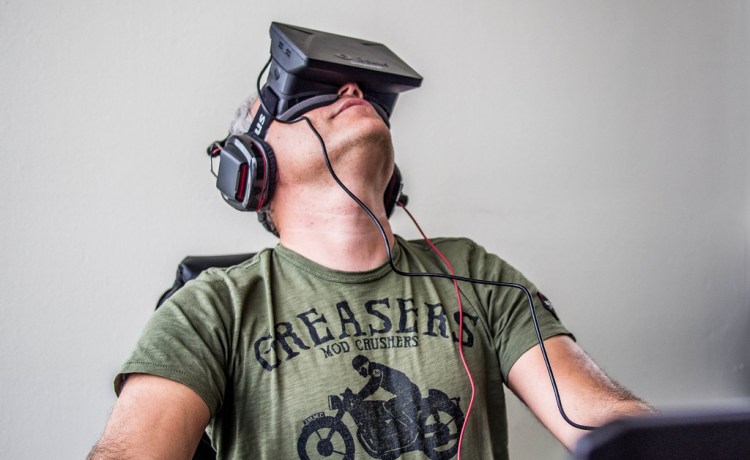Sex, death, and identity
Virtual reality will enable you to have sex with the person of your dreams. You could combine the best features of the world’s most attractive people, and then you could enter a simulation to get down to business with your Weird Science creation.
Here’s the other side of that equation: Virtual reality will enable anyone to have sex with you.
Virtual reality isn’t just about getting the next big triple-A release from a gaming publisher. It is about wish-fulfillment. For a lot of people, that might mean re-creating someone they know from their physical life and doing things to them that they normally wouldn’t get to. It won’t take much to build these avatar representations of ourselves and others, either. We have near-endless pictures of ourselves that software can analyze and transpose onto a three-dimensional frame. Similar software could even look at our social media profiles and our videos to generate our voices and personalities. It sounds fantastical, but it is also probably inevitable.
And the worst part is that you won’t have any control over your identity anymore.
“Somebody can build an avatar of you, and once that avatar is built, it can be copied 10 million times and then 10 million more,” said Bailenson. “People can take it and animate it, make it do things that you’ve never done.”
It’ll look and sound like you. The video recording will look like a real video recording. Most people will just assume it actually is you. But it isn’t.
“Think about what virtual songs did to the music industry,” said Bailenson. “It was as disruptive as you can imagine. It changed the way bands form. Avatars are going to do the same thing for the notion of self. Meaning, ‘myself’ used to be contained to my body, pictures, and video. Once avatars become mature — where they’re these amazingly realistic things — the nature of what it means to be a person and to have an identity might change in a way that is similar to the way the music industry changed when it met digital songs.”
Prototypes of those kinds of avatars exist today. Wicked Entertainment, an adult-film company, already has a demo of one of its porn stars that Oculus Rift users can interact with in limited ways.
If you’re wondering where we’re at now in terms of realistic-looking digital characters, check out this NSFW video of avatars built in the popular Unity graphics engine.
Of course, not every use of avatars will involved sex. Futurist and Google engineer Ray Kurzweil is working on a project to bring back a digital representation of his dead father, Fredrick Kurzweil.
“I have all of his correspondence and letters he wrote to my mother — videos and pictures and so on,” Kurzweil told documentary filmmaker Morgan Spurlock in an interview. “We can access his DNA from his grave site, and a future artificial intelligence could take all this information and create an avatar that would be indistinguishable from the original Fredrick Kurzweil to people who knew him.”
If you die, but the world never loses you, then what is death? And what does this mean for grief? Maybe nothing … or maybe something worse than that.
A world without humans
Demolition Man, another dystopian sci-fi film, has a scene where the future-dwelling Sandra Bullock invites man-from-the-past Sylvester Stallone to make love. He thinks they’re gonna do it the old-fashioned way when she breaks out a pair of virtual-reality headsets that enable them to simulate the good parts of the act without the messy fluids and touching.
The reality is probably even more lonely than that. You don’t need Stallone or Bullock in the room. With VR, you can call up their avatar whenever you want.
That leads to a slippery question. What happens when humans can simulate anything that they want?
Why would you ever suffer through a blind date or setting up an OK Cupid profile when you can get exactly what you want whenever you want it without any effort with the help of your Oculus Rift?
For that matter, why go and do anything? Why would you travel the world? Why would you buy a big-screen television? Why would you explore space? You can do all of that from the comfort of your own home while possibly avoiding anything unpleasant or unpredictable.
This could lead to a generation of people who no longer strive for anything because they have everything they desire. Virtual reality, at its most dystopian, could stunt the growth of humanity. Maybe the reason we’ve never met an advanced alien species is because they all stop evolving the moment they create VR.
While Bailenson worries about VR, the idea of humans abandoning society to simulate everything doesn’t bother him.
“Kids in the United States between ages 8 and 18 already spend eight hours a day consuming media,” he said. “That’s outside of the classroom and not counting when they’re sleeping, so kids are already spending more time connected than they aren’t. The question is not whether they will spend time in simulation because they already are. The question is when that becomes more immersive, will that change the game? Will some of the content inspire them rather than just satiate them? The technology is coming like a freight train, and we’ll need a way to minimize the damage while maximizing its good uses.”


